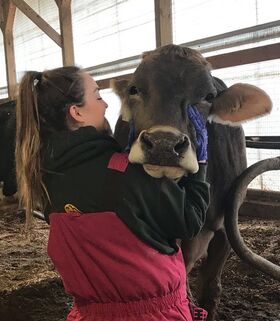CONSERVATION CORNER
A weekly blog for all things conservation
 By: Miranda Neville, Agricultural Resource Specialist, BCCD Last week I wrote about how farmers and the industry are growing and evolving exponentially. This week, I’d like to focus on how gender roles have also changed and evolved in the agriculture world. Historically agriculture has been a male dominated industry. Still true today, but the number of women with hands-on involvement or decision-making power on farms is rapidly increasing. Women are also serving an ever-increasing role in the agriculture industry in other ways such as agriculture educators, animal nutritionist, A.I. breeders, veterinarians, CONSERVATION DISTRICT employees, milk testers, and quality assurance inspectors, to name a few. In the past women’s roles in the agriculture industry were typically that of farmers’ wives. Their primary duties were to cook, clean, tend to the children, and all of the ‘traditional’ concepts. For example, in my family, my grandmother raised nine children, made clothing and meals from scratch, had 3 full meals ready for when my grandfather came in from working the dairy all day, got the kids ready and off to school, kept the house, and tended to a garden large enough to feed them all. She worked from sunup to sundown, just like my grandfather, but rarely made it out to the barn. During those times, it was common for young women to be encouraged to seek other opportunities while sons were raised with the expectation of taking over the family farm.
Fast forward 70 years and many farm women may still have traditional roles, but farmers’ wives like my grandmother, are also now finding themselves extending much further to survive in the farming financial crisis. If married to a dairy farmer, a vast majority of women are having to work an off-farm job (whether it be ag related or not) to supplement financially or at least, to carry the health benefits while still assisting with farm responsibilities. Though they may be working off the farm during the week, that doesn’t mean they get ‘weekends off’, either. That just means there is more time to assist with farm tasks that there wasn’t enough time for or enough hands to manage from Monday through Friday. (I would know. I have first-hand experience on this one!) Another common scenario in the farmHER dynamic – working side-by-side, husband and wife, on the farm as partners sharing in management decisions and labor efforts 24/7/365. The biggest change, since my grandmothers’ generation though, is that more and more women are coming back to the family farm (or never leaving) to take over as the farmer, themselves. Never to be underestimated, they can milk cows, toss hay, drive tractors, and wrangle wild heifers (which comes in handy if she is also had young children). Finding a balance can be the hardest tasks for farmers, especially farm women. The demands are constant, the days are too short, the hours may seem too long. Money is in short supply and their to-do lists are endless. Thankfully some are able to find friendship and consolation in social media outlets. Like my grandmother who rarely left the confines of the farm to socialize, women nowadays are able to connect with other women; from other states or countries, from all different walks of life, but all sharing the common bond over the love of farming and agriculture. There are endless Facebook groups dedicated to sharing tips and tricks of the trade like: calf weaning, dinner recipes, where to find the best barn boots, sharing funny stories, and most importantly being a safe space for when times are the hardest. A common joke among women in the dairy community is “you know you’re a dairy farmer when your milkhouse is cleaner than your actual house.” So, here is to all the farmHER’s out there. On the farm full time, part time, have limited affiliation with farm work but are there to support your farmer in other ways; whether you were raised with a farming/agricultural background or are learning as you go - your contributions to agriculture matter. So please, encourage women you know who have the passion for agriculture. The only way this industry can grow and succeed is to plant the seed in our youth, male or female. The Bradford County Conservation District is committed to helping people manage resources wisely. You can visit the Bradford County Conservation District at 200 Lake Rd in Wysox across from the Wysox Fire Hall. Contact us at (570) 485-3144 or visit our web page at www.bccdpa.com.
0 Comments
Leave a Reply. |
AuthorsVarious staff at the Bradford County Conservation District Archives
July 2024
Categories
All
|
|
Bradford County Conservation District
Stoll Natural Resource Center 200 Lake Road, Suite E | Towanda PA 18848 Phone: (570)-485-3144 |
